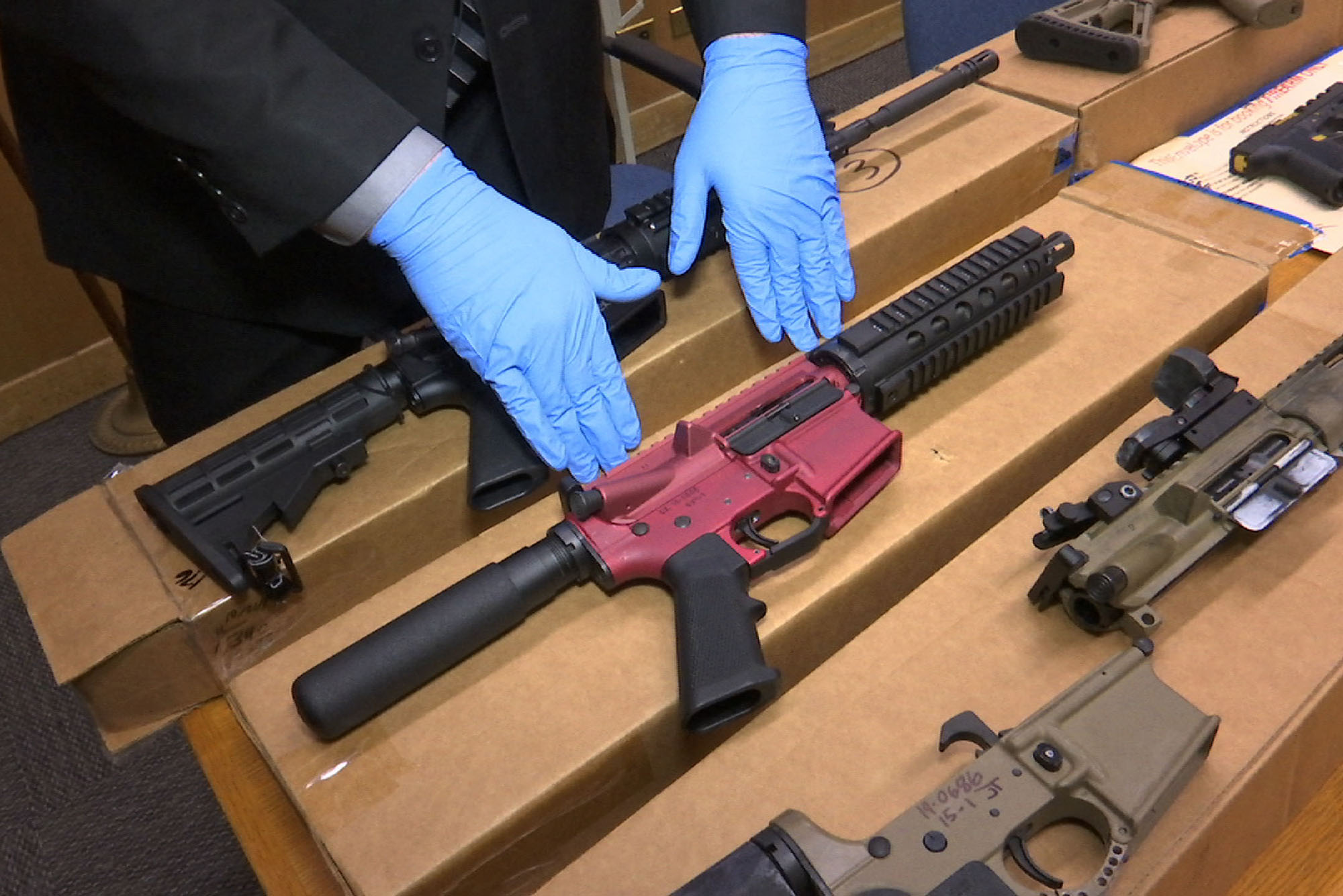Will the New Massachusetts Law on Ghost Guns, Assault Weapons, and Gun-Carrying Pass Legal Muster?
Boston University’s Cody Jacobs believes it will, despite the NRA’s rhetoric

Massachusetts’ new gun law requires traceable serial numbers on components of ghost guns, which can be assembled at home. Photo by AP/Haven Daley
Will the New Massachusetts Law on Ghost Guns, Assault Weapons, and Gun-Carrying Pass Legal Muster?
Boston University’s Cody Jacobs believes it will, despite the NRA’s rhetoric
With that, Massachusetts State Rep. Michael Day (D-Stoneham) dared the National Rifle Association (NRA) to sue the commonwealth over a new gun safety law, a law Day sponsored in the House of Representatives and Governor Maura Healey signed last month. The NRA announced plans to challenge the “egregious” and “freedom-restricting” statute, which slightly expands the state’s assault weapons ban and red flag law—a law that lets courts temporarily confiscate guns from those deemed a threat to themselves or others—while tightening regulation of ghost guns and gun-carrying in public places. (Other opponents of the law hope to get it on the state’s 2026 ballot for a repeal referendum.)

Ghost guns are assembled from components that don’t have serial numbers, and thus cannot be traced by law enforcement. The new law requires all firearms and key parts to have a number and imposes penalties for creating, possessing, or transferring untraceable firearms. It also bans everyone but police from bringing guns to schools, voting places, and government buildings. And it expands the state’s red flag law by authorizing school administrators and licensed healthcare workers to petition for confiscation.
Healey, who was the state’s attorney general before being elected governor, says the law would “withstand any challenge that comes its way.” And yet the US Supreme Court in 2022 struck down New York’s restrictions on the concealed carrying of guns [New York State Rifle & Pistol Association, Inc. v. Bruen].
So is the confidence of Massachusetts leaders warranted?
BU Today asked Cody Jacobs, a lecturer at the School of Law and a former staff attorney tracking Second Amendment lawsuits for San Francisco’s Giffords Law Center to Prevent Gun Violence.
This interview has been edited for brevity and clarity.
Q&A
with Cody Jacobs
BU Today: On what grounds do you expect opponents to challenge this law in court?
Jacobs: I was trying to figure that out. There’s a big disconnect between the NRA rhetoric on this and what the law actually does. There’s already a case pending in the [federal] First Circuit [Court of Appeals], challenging Massachusetts’ assault weapons ban. The new law adds some things to the assault weapons ban; it puts in place a robust gun registration system. While these are all great reforms—and I support them from a policy perspective—from a Second Amendment perspective, none of what they’re doing here is egregiously groundbreaking, as the NRA is trying to make it sound.
Lawsuits all over the country are challenging assault weapons bans on the basis of Bruen. But this doesn’t add anything where they can say, “Massachusetts is way out on a limb relative to other states here.” Looking at the expansion of the assault weapons ban [in the just-signed law], it’s actually pretty modest.
Massachusetts has a two-factor test for what constitutes an assault weapon: first, a center-fire gun [which has a particular ignition system propelling the bullet], or a semiautomatic rifle that’s capable of accepting a detachable magazine. Then, it also has to have two other features, from a list, that make something an assault weapon. This bill adds a new item on that list: a cover on the barrel that allows the person firing to have less heat on their nontrigger hand, which allows the shooter to fire lots of times without pausing. That is bad, if you think about mass shootings and the ability to fire lots of rounds. California and Connecticut only require one additional military-style feature to make assault weapons. [Massachusetts is] still a two-factor test, a much looser assault weapons ban than these other two states.
The content of this bill—I don’t think it matches the apocalyptic rhetoric that the gun lobby seems to have about it.
The content of this bill—I don’t think it matches the apocalyptic rhetoric that the gun lobby seems to have about it.
BU Today: So you think the law will pass legal muster?
This law on its own, in isolation—yes, absolutely. But there’s already underlying litigation about the legality, under the Second Amendment, of Massachusetts’ and other states’ assault weapons bans. It’s only a matter of time before the Supreme Court takes up an assault weapons ban case. I think assault weapons bans in general could very well be in trouble, given the way that the court has looked at [gun cases]. They’re very skeptical of gun laws. Justice Brett Kavanaugh, when he was on the D.C. circuit court, actually wrote a dissenting opinion in a case where he would have struck down the District of Columbia assault weapons ban. But I don’t think there’s any serious Second Amendment distinction between what [the Massachusetts] assault weapons ban was before this law was signed and what it is now.
BU Today: Could the Massachusetts law go to the Supreme Court?
I would be very surprised if it did, honestly. Besides the assault weapons ban, [other provisions] are things that even in conservative courts haven’t been seriously threatened under the Second Amendment.
Guns have to be sold by federally licensed firearms manufacturers and not made in do-it-yourself kits. Federal law already requires guns manufactured in the United States to have a serial number. It’s kind of a gray area how that applies to ghost guns, but guns that are manufactured by federally licensed firearms manufacturers all have to have a serial number. I don’t think [challenging] this would get very far, even with this Supreme Court.
As for red flag laws, if you look at the Rahimi decision that they just announced [upholding gun bans for accused domestic abusers], it seemed like the court was sympathetic to laws protecting against people who are dangerous from having guns. Red flag laws include due process; it requires a judge to actually make that determination.
BU Today: Any insights into how effective the Massachusetts bill might be in curbing gun violence?
It’s important to recognize with gun regulation that—to use a gun metaphor—there’s no silver bullet. There’s no way I can, with a straight face, be like, “If you get rid of those shrouded barrels, that’s totally going to fix gun violence in Massachusetts.” At the same time, every little bit is important. [Lower] rates of gun violence and gun deaths in particular are pretty highly correlated with having strong gun laws. Massachusetts has one of the lowest gun death rates in the country. That’s because we have strong gun laws.
None of these things by itself is going to be huge, but I think that taken together, this is a good step in the right direction.

Comments & Discussion
Boston University moderates comments to facilitate an informed, substantive, civil conversation. Abusive, profane, self-promotional, misleading, incoherent or off-topic comments will be rejected. Moderators are staffed during regular business hours (EST) and can only accept comments written in English. Statistics or facts must include a citation or a link to the citation.